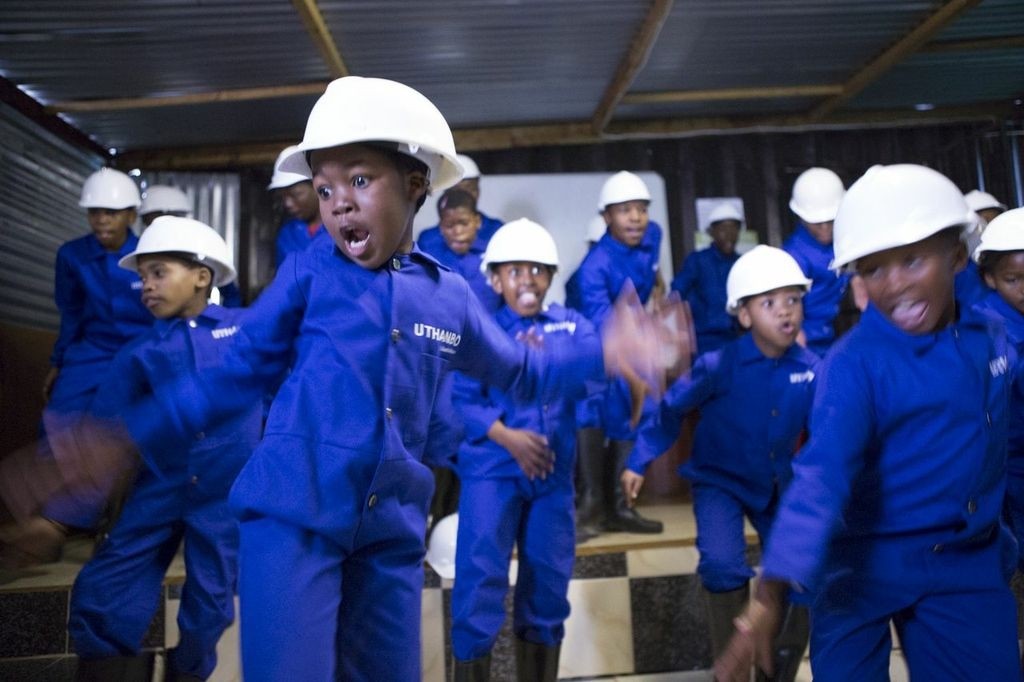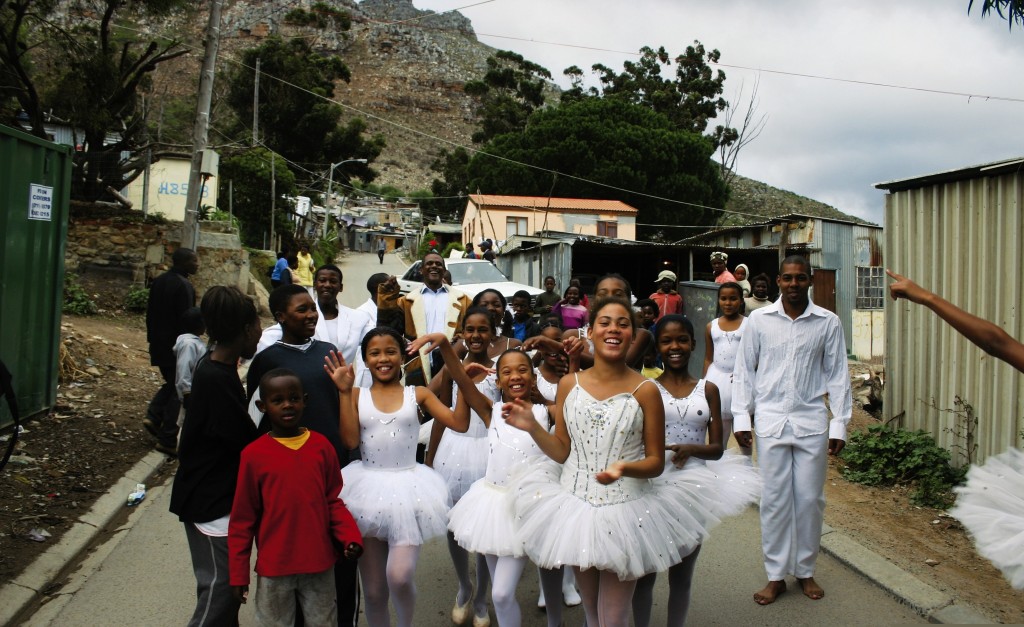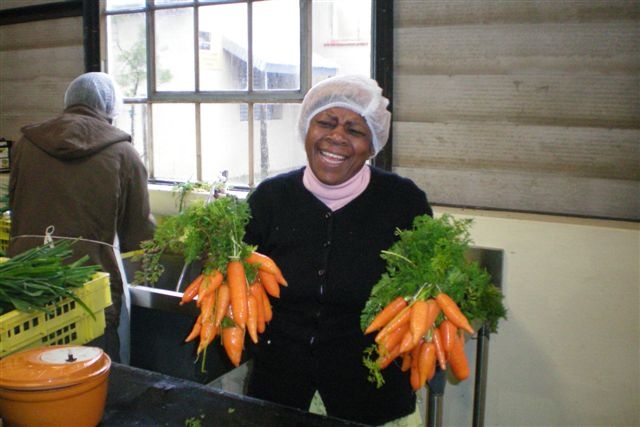LOVE, JAMES
KATIE PALMER TALKS WITH UTHANDO’S JAMES FERNIE ABOUT STORYTELLING, THE SPIRIT OF UBUNTU AND WHAT IT MEANS TO BE MADE IN AFRICA
WORDS BY KATIE PALMER
The first thing that strikes me about the Executive Director of Uthando is the way he signs off his emails: “Love, James”. That the name of this South African non-profit translates as “Love” may well be a contributing factor – any clever marketer knows that injecting personality into your signature is a wise move in building brand identity – but in a world of “sincerely” and “regards”, this small informality is surprisingly touching.
Brought up “in the dark decade of the 1980s,” James Fernie is a product of his “very politicised, anti-apartheid family” and a self-confessed “natural activist at heart”. Having experienced the brutality of apartheid first-hand, being Made in Africa is a defining feature of his character and the crux around which he has built his career – or, more accurately, his life.
As a young law graduate, Fernie took his first steps into the world of work at corporate law firm Clifford Chance in the UK, before changing track with a six-month traineeship at The European Commission Humanitarian Office in Brussels. On returning to South Africa he resumed legal work for several years before making another jump, this time into the high-end travel industry, when he took up with Inspiration Places in the role of international marketer.

It was while building his professional tourism network that Fernie realised his deep affection for the Rainbow Nation was shared with many others throughout the industry, both in South Africa and around the world. “You have many tour operators who are sitting in their offices in New York and London and Paris and Munich, and they are not only promoting South Africa as part of their business, but many of them are very passionate about South Africa – they love the country and they love the continent.” Being Made In Africa, then, is not reserved for those born on the continent.
Yet, despite a long-held desire to contribute to his country at a grassroots level, Fernie’s real ‘eureka’ moment didn’t come until 2006 when he visited the Jikeleza Dance Project in Hout Bay. “I sat watching these kids who came from very, very poor backgrounds doing classical-based dance and ballet, and even as a Capetonian it was so amazing to see that. I thought, imagine bringing visitors to South Africa to see a project like this – if that’s how I feel as a local, imagine how foreigners would feel. It would be an amazing, real, true, positive South African story that they would never otherwise have the opportunity to see.”
Thus, Uthando was born. Its mission? “To provide the infrastructure to link tour operators to community development projects in a myriad of ways, so that we are really giving credence to the whole philosophy of responsible tourism and community bridge building, but also connecting people from all over the world with local people who are doing amazing things.” In other words, to tell the story Made in Africa.
The latter is what really sets Uthando apart. Unlike many (no doubt admirable nonetheless) non-profit organisations, its focus is first and foremost to demonstrate all that South Africa has to offer, with the pleasant side-effect of raising money for a good cause. “We are merely showcasing these wonderful people who are doing wonderful things – and in so doing we are also helping them, so really everybody benefits.”

Perhaps this is telling of the fact that the so-called ‘African’ stereotype Fernie struggles with the most is “the sense that Africa is a continent which is based on handouts… There are people living in these communities who are incredibly tenacious and resilient and innovative and inspiring and hard-working. We want to show those stories.” To do so, Uthando relies on a broad network of narrators, in order to connect as many travellers and tourism stakeholders as possible with the people in the townships.
A couple of years ago, for example, Uthando took Mount Nelson head chef Rudi Liebenberg to visit the Siyazama (meaning “we are trying”) Garden in Khayelitsha, which is part of Abalimi Bezekhaya – an urban agriculture and environmental action association operating in socio-economically neglected townships near Cape Town. “He was so impressed with the quality of the vegetables that the Mount Nelson started getting a percentage of their vegetables from the townships every week; now they actually have an Abalimi Bezekhaya salad on the Planet Restaurant menu. So, as a result of that introduction, we are telling the authentic story of this wonderful community project that forms part of South Africa, and a wonderful symbiotic relationship has developed between South Africa’s oldest five-star hotel and a community project that is working with 5,000 people in urban agriculture.”
Uthando utilises more traditional methods of storytelling, too. So far, they have published two books: the Seed to Table Cookbook, which tells the story of Abalimi Bezekhaya; and Abantu Abadala: Conversations with the Elders – a book of non-fiction short stories, as told by South African seniors. “For many years I wanted to tell that story, because here you have these incredible seniors in their 60s, 70s, 80s, and some were even in their 90s, who suffered terribly during apartheid and suffer still because of poverty; yet they have such incredible stories to tell and they are so open and so loving and so friendly.”
When I ask which project Fernie considers to be Uthando’s greatest success, it’s as though I’ve asked him to name his favourite child. “Every single project is so different in its own way. I think the greatest success for Uthando is the joy that has been created through bringing so many thousands of people together over so many years. Tour operators, marketing companies, trade show operators, hoteliers, travellers…”

“But,” he concedes, “I guess the seniors project is one that is very close to my heart. What we tell people when they’re going to meet the seniors is that they will get a sense of Mandela when they meet them, because he is the epitome of the spirit of Ubunto, which they all have – their spirit of forgiveness, of love, of sharing. I felt a sense of urgency to capture their stories, because once that generation is gone, that value system will go with them, unfortunately.”
Intrigued by this concept of ‘Ubuntu’, I looked it up after our conversation – and this is what I found: “Ubuntu is the potential for being human, to value the good of the community above self-interest. Ubuntu is to strive to help people in the spirit of service, to show respect to others and to be honest and trustworthy.” Despite what he says, talking to James Fernie has convinced me that the spirit of Ubunto lives on.
To find out more about Uthando, head to www.uthandosa.org or visit the Untold Stories stand at We Are Africa. We Are Africa tribe members can take part in an exclusive Uthando pre-tour – to find out more, contact nyarai@beyondluxury.com.
John Segar
READ MORE POSTS BY THIS AUTHOR











